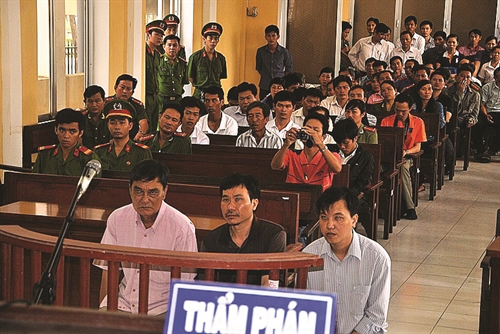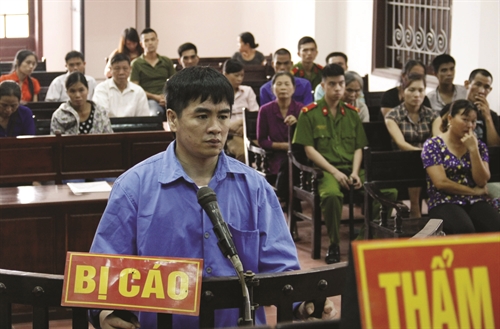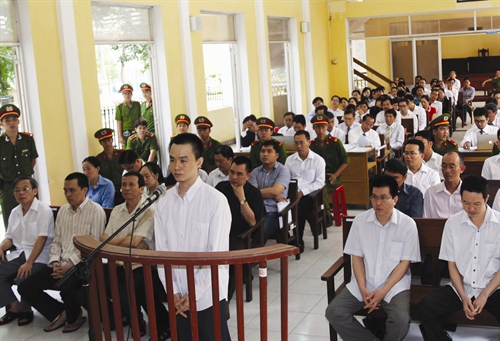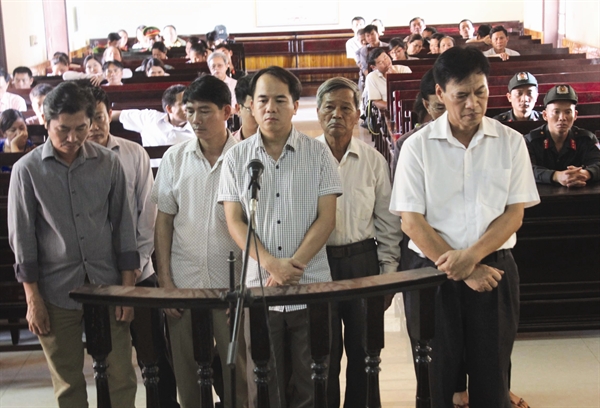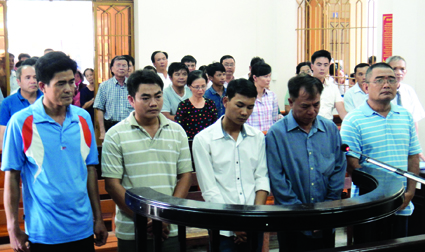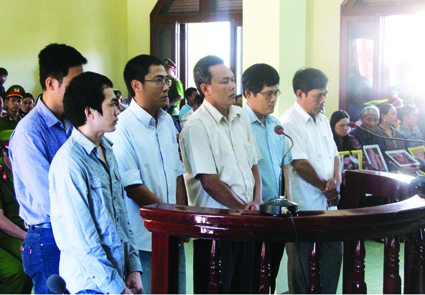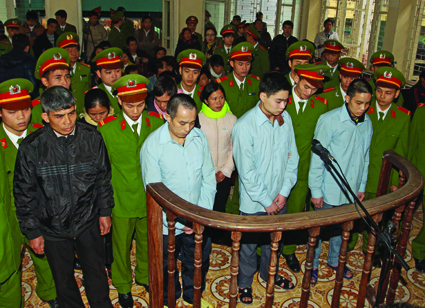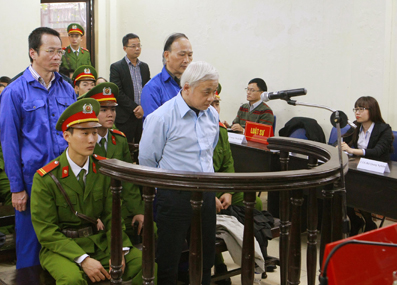The revised Penal Code (the 2015 Code) was just passed by the National Assembly at its year-end session and will take effect on July 1 next year. New provisions on the penal liability of legal entities make up the most important change in the Code since its initial promulgation in 1985.
Nguyen Cong Long
Justice Department, National Assembly Office
Penal liability of legal entities - a progress in criminal legislation thinking or a change in criminal policy?
Around the world, the liability of legal entities for criminal offenses has long been recognized in order to effectively fight crimes in the modern societies. In Vietnam, this issue has been the subject of jurisprudent research over the past 30 years. But, back in 2009 when the National Assembly debated some amendments to the Penal Code, the proposal to hold legal entities accountable for criminal offenses was still strongly refuted by not a few competent agencies on the ground of lack of thorough research (!).
Only with this comprehensive revision of the Penal Code, did lawmakers finally decide on this historic landmark in Vietnam’s legislative thinking and criminal policy. In both theory and practice, the danger of legal entities, as institutions of human beings themselves, to cause harms to the society is real, even higher than that of natural persons in some aspects. According to the country’s judicial reform orientations until 2020, the requirement to establish as crimes socially dangerous acts that newly emerge in the process of socio-economic, scientific and technological development and international integration should be understood to be applicable to both natural persons and legal entities. The increasing number and seriousness of violations, mostly related to environmental pollution, trade fraud and tax evasion, committed by businesses in the last years have attested to the ineffectiveness of administrative and civil sanctions. Eventually, the legislative body has adopted a clear attitude toward the issue: The provisions on the penal liability of legal entities in the 2015 Code aim to affirm the Vietnamese State’s viewpoint on strictly punishing violating legal entities, meeting the requirements of the crime prevention and combat in the new situation, especially serious violations of economic and environmental laws. These provisions not only ensure the overall uniformity of the legal system but also guarantee the equality between Vietnamese legal entities overseas and foreign legal entities in Vietnam[1].
It should be added that the establishment of the penal liability of legal entities will lead to major changes in the criminal procedural rules. But the criminalization of violations of legal entities will help create a transparent mechanism to better protect lawful interests of both victims and violating legal entities than the administrative sanctioning mechanism does[2].
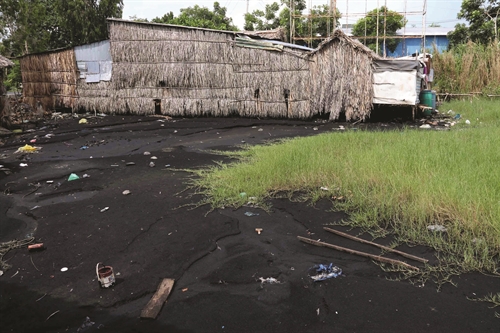 |
| Environmental pollution caused by untreated coal dust discharged from fishmeal processing plants in Ca Mau province __Photo: Kim Ha/VNA |
Scope of penal liability of legal entities
In Vietnam’s criminal justice, penal liability is always prescribed in the Penal Code as a ground for determining penalties and other criminal coercive measures. This principle is also applied to all provisions concerning legal entities in the 2015 Code. In addition to the general provisions of Chapter I, the 2015 Code has a fresh chapter (Chapter XI) to deal with offenders being legal entities.
At present, only individuals committing a crime prescribed in the Penal Code must bear penal liability. For legal entities, a similar provision is added in Article 2 of the 2015 Code, which says: “Any commercial legal entity that commits a crime prescribed in Article 76 of this Code shall bear penal liability.” The definition of offender (Article 8) also mentions this type of offender. Under these provisions, not all legal entities, but only “commercial” legal entities (below referred to as legal entities) may be examined for penal liability. According to Article 75 of the revised Civil Code[3] and Articles 2 and 8 of the 2015 Code, commercial legal entities are legal entities that have the primary goal of seeking profits to be divided to their members, including enterprises and other economic entities, can be regarded as. In sum, as defined in Clause 16, Article 3 of the Investment Law, legal entities including enterprises, cooperatives, unions of cooperatives and other organizations conducting business investment activities, have “a chance” to become offenders. On the contrary, non-commercial legal entities that do not have the primary goal of pursuing profits are excluded from penal liability. These entities include state agencies, political organizations, socio-political organizations, socio-political-professional organizations, social organizations, socio-professional organizations, social funds, charity funds, social enterprises and other non-commercial organizations (Article 76 of the Civil Code).
Regarding conditions of a legal entity to bear penal liability, in addition to the condition on the statute of limitations for penal liability examination, a legal entity must bear the penal liability when the following three conditions are fully met:
(i) The criminal offense is committed on behalf of the legal entity, i.e. committed by the lawful representative (competent or lawfully authorized representative) of the legal entity;
(ii) The offense is committed for the benefit of the legal entity. In case a criminal offense is committed by the lawful representative of the legal entity but not for the latter’s benefit, only such representative will be examined for penal liability. For example, if the director of a company evades payment of social, health and unemployment insurance premiums but the company does not benefit from the evaded amounts, it cannot be held liable for such offense; and
(iii) The offense is committed under the legal entity’s instruction or approval. This condition ensures conformity with the above conditions. In case a criminal offense is committed on behalf of the legal entity for its benefit but neither within an assigned task, vested power or nor in compliance with a resolution or decision of its Members’ Council or Shareholders’ General Meeting or approved production or business plan or process, the legal entity cannot be compelled to bear legal consequences.
The 2015 Code establishes 31 crimes in the economic and environmental sectors, including 22 crimes specified in Chapter XVIII (crimes infringing upon the economic management order) and nine others in Chapter XIX (environment-related crimes), for which legal entities may be charged. This selection has been based on the following considerations:
- The liability of legal entities for criminal offenses is novel to Vietnam’s legislation and should be dealt with in an appropriate and prudent manner;
- The prevalence and social danger of violations committed by legal entities; and,
- Experiences of foreign countries.
As violations committed by enterprises in the economic and environmental sectors have been increasing in the past years, the imposition of penalties on these legal entities aims first of all to effectively address this situation.
Moreover, the establishment of a number of crimes in the economic and environmental sectors will, to some extent, ensure better realization of Vietnam’s commitments in treaties it has acceded to. These crimes include: infringing upon copyright and related rights (Article 225); infringing upon industrial property rights (Article 226); breaching the regulations on forest exploitation and protection and forest product management (Article 232); and breaching the regulations on management and protection of endangered, precious and rare animals (Article 244)[4].
Another noteworthy point of the 2015 Code is that it not only contains provisions designed to implement treaties but also directly refers to provisions of these treaties as the basis for charging offenders. For example, with regard to acts of illegally stockpiling, transporting, processing or trading in large volumes of endangered, precious and rare plant timber, and illegally hunting, killing, rearing, holding in captivity, transporting or trading in endangered, precious and rare animals, the Code says that the basic elements and aggravating circumstances of the crime of breaching the regulations on forest exploitation and protection and forest product management and the crime of breaching the regulations on management and protection of wild animals must be identified based on Annexes I and II to the Convention on International Trade in Endangered Species of Wild Fauna and Flora (CITES) respectively. Similarly, the examination of the liability for the crimes of causing environmental pollution (Article 235) and bringing waste into the Vietnamese territory (Article 239) must be based on Annex A to the Stockholm Convention on Persistent Organic Pollutants. Perhaps this is the first time Vietnam’s criminal law accepts to apply the new legislative technique of directly referring to provisions of treaties as the basis for determination of specific crimes.
 |
| Polluting garbage treatment plant in Thai Binh city, Thai Binh province __Photo: Xuan Tien/VNA |
Penalties and judicial measures against legal entities
The principles of punishment of convicted offenders, whether they are individuals or legal entities, remain the same in the 2015 Code as compared to the previous Penal Codes. Accordingly, penalties aim to punish offenders as well as educate them to observe the law and rules of life and concurrently educate other individuals and legal entities to respect the law. Penalties applicable to legal entities still aim to strip or restrict their rights and interests, However, they are not targeted directly at the freedom of body or rights of each individual member of the offending legal entity but mainly at its property or status (Articles 30, 31 and 33 of the 2015 Code). Penalties and judicial measures applicable to legal entities include:
Principal penalties:
- Fine (Article 77): This penalty may be imposed for any crime which a legal entity may be convicted of. To ensure the deterrent nature of fine and help make up for part of the caused damage, fine levels applicable to legal entities are very high, ranging from VND 50 million to 20 billion[5]. To ensure the enforceability of fine, Clause 2 of Article 77 prescribes a principle that the trial panel may decide a fine level based on the nature and seriousness of the crime, taking into consideration the financial status of the offending legal entity and price fluctuation.
- Suspension from operation (Article 78): A legal entity that is imposed this penalty will be suspended from operation for between six months and three years in one or several sectors in which it has committed a crime causing harm to human life and health, the environment or security, social order and safety with practically remediable consequences. Compared to similar sanctions prescribed in the Law on Handling of Administrative Violations, this penalty is applicable to all legal entities regardless of whether they have licenses or not, and is more stringent with a much longer suspension duration.[6]
- Termination of operation (Article 79): The operation of an offending legal entity shall be terminated in one or several sectors in which it has infringed upon or is likely to infringe upon many people’s lives, or cause an environmental incident, or badly impact security, social order and safety, and is unable to remedy consequences. If the legal entity has been established only to commit the crime, its whole operation shall be terminated forever. This is the most severe penalty, a variant of the death penalty, to be imposed on legal entities. Of the 31 crimes for which commercial legal entities must bear liability, many are subject to this penalty.[7]
Additional penalties:
- Ban from conducting business or operating in some sectors (Article 80): This penalty may be imposed against a convicted legal entity when its continued business or operation in such sectors is deemed harmful to human life or health or dangerous to the society. Since it is difficult to identify business lines and sectors to be subjected to the ban due to their diversity and criminal nature in each case, Clause 2 of Article 80 allows the court to decide on specific business lines and sectors in which convicted legal entities are banned from doing business or operating. This ban may last between one and three years after the judgment takes legal effect. This penalty is prescribed in almost all articles of Chapters XVIII and XIX.[8]
- Ban from raising capital (Article 81): This additional penalty may be imposed against a convicted legal entity when its capital raising activity is deemed likely to make it relapse into crime. This ban may last between one and three years after the judgment takes legal effect. A legal entity that is imposed this ban may not (i) take loans from banks, credit institutions or investment funds, (ii) issue or offer securities, (iii) raise capital from clients, (iv) enter into joint ventures or associations at home and abroad, and (v) form real estate trusts.
On a case-by-case basis, the court may impose one or several of the above types of ban from raising capital.
Though this penalty is specially designed for economic crimes, it may also be imposed for environment-related offenses, such as destroying aquatic resources (Article 242), destroying forests (Article 243), breaching the regulations on management and protection of endangered, precious and rare animals (Article 244), breaching the regulations on management of nature reserves (Article 245), and importing or spreading harmful exotic species (Article 246).
Judicial measures (Article 82)
Judicial measures aim to remedy damage or additionally punish offenders. In the 2015 Code, these judicial measures are also applicable to legal entities. Reality shows that legal entities may cause great economic and environmental damage. However, unlike individuals, the enforceability and effectiveness of remedial measures applied to legal entities are higher. Therefore, the 2015 Code prescribes more judicial measures than penalties. In addition to the measures applicable to individuals, such as confiscation of objects and money directly related to crime (Article 47); and return of property, repair or compensation for damage, compelling to make public apologies (Article 48), courts may decide to apply many other judicial measures to legal entities, such as forcible restoration of the original state altered due to crime (for example, replanting of destroyed forests; reconstruction of destroyed irrigation works, dikes, natural disaster prevention and combat works, works for protection, exploitation, use of water resource, flood prevention and combat works). Besides, one or some of the following measures to remedy or prevent crime consequences may be enforced:
(i) dismantlement of works or parts of works constructed without permit or at variance with permits;
(ii) remediation of environmental pollution or epidemic spread;
(iii) Bringing out of the Vietnamese territory or re-export of goods, articles or vehicles brought into Vietnam or imported in contravention of law, or temporarily imported for re-export but not yet re-exported in accordance with law; imported or transited goods infringing upon intellectual property rights, goods bearing counterfeit intellectual property subject matters, vehicles and materials imported to be used mainly for manufacturing or trading in goods bearing counterfeit intellectual property subject matters after infringing elements are removed;
(iv) Destruction of goods and articles harmful to health of humans, domestic animals and plants and the environment, cultural products with harmful contents, or other material evidences subject to destruction in accordance with law;
(v) Removal of infringing elements from goods, goods packages, instrumentalities of business and articles; and
(vi) Recall of infringing products and goods being circulated on the market.
Some other specific provisions
On principle, when an offending legal entity is examined for penal liability, extenuating as well as aggravating circumstances of this offender must be fully considered. As this type of offender has particular characteristics and conditions for it to bear penal liability are diverse (Article 75), these circumstances are different from those of individual offenders. While most of extenuating and aggravating circumstances of individual offenders involve their personal identification characteristics at the time of committing crimes, those of legal entities are mainly their attitude after committing a crime. In this spirit, Article 84 of the 2015 Code provides five circumstances that may extenuate the penal liability of a legal entity:
(i) having prevented or mitigated harms caused by the crime;
(ii) voluntarily repairing, paying compensation or remedying consequences;
(iii) having committed the crime without causing any damage or having caused negligible damage;
(iv) actively cooperating with procedure-conducting agencies in the settlement of the case; and
(v) having made contributions to the implementation of social policies. Additionally, when deciding on penalties, courts may regard other circumstances as extenuating.
Article 85 of the 2015 Code prescribes the following circumstances aggravating the penal liability of legal entities:
- Colluding with other legal entities in committing a crime, which can be regarded as “committing a crime in an organized manner.” However, “collusion” should be understood as an act jointly performed by two legal entities. Reality has shown that collusion is fairly common in economic crimes, for example: collusion to manipulate the securities market, intentionally disclose untruthful information or conceal information in securities offering, listing and trading activities; collusion between enterprises in making, transporting and trading in counterfeit or banned goods, etc;
- Intentionally carrying out a crime to the end, which should be understood as being determined to realize the criminal intention and complete the criminal act despite dissuasion or other obstacles in the course of committing the crime.
- Committing a crime for two or more times; recidivism or dangerous recidivism;
- Taking advantage of war conditions, a state of emergency, a natural disaster, an epidemic or other special difficulties of society to commit a crime; and
- Using treachery to commit a crime, or to shirk investigation, or to conceal a crime.-
To ensure the adequate implementation of the Convention on International Trade in Endangered Species of Wild Fauna and Flora (CITES)
